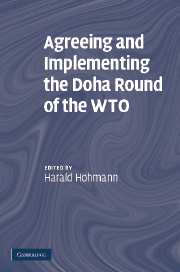Book contents
- Frontmatter
- Contents
- List of Contributors
- Foreword
- Introduction
- The future of the Doha Round
- PART ONE Development policy of the WTO
- PART TWO Trade policy (including competition) and trade facilitation
- PART THREE Reform of the dispute settlement system
- 11 Reforming the dispute settlement system through practice
- 12 Reforming the Dispute Settlement Understanding
- 13 The WTO dispute settlement system: Jurisdiction, interpretation and remedies
- 14 An evaluation of the role of legal aid in international dispute resolution, with emphasis on the Advisory Centre on WTO Law
- PART FOUR Social rights, health, and environment
- PART FIVE Conclusions
- Index
12 - Reforming the Dispute Settlement Understanding
from PART THREE - Reform of the dispute settlement system
Published online by Cambridge University Press: 23 February 2010
- Frontmatter
- Contents
- List of Contributors
- Foreword
- Introduction
- The future of the Doha Round
- PART ONE Development policy of the WTO
- PART TWO Trade policy (including competition) and trade facilitation
- PART THREE Reform of the dispute settlement system
- 11 Reforming the dispute settlement system through practice
- 12 Reforming the Dispute Settlement Understanding
- 13 The WTO dispute settlement system: Jurisdiction, interpretation and remedies
- 14 An evaluation of the role of legal aid in international dispute resolution, with emphasis on the Advisory Centre on WTO Law
- PART FOUR Social rights, health, and environment
- PART FIVE Conclusions
- Index
Summary
Abstract
The Dispute Settlement Understanding has been under continuous review since its inception. The WTO members confirmed in the current negotiations on the DSU, as set out in the Framework Agreements agreed at the end of July 2004 (the so-called July Package) and in the Hong Kong Ministerial Declaration that the review process should continue and be successfully concluded by the end of 2006, but this did not happen. This chapter intends to give an overview over the reform debate and its history, and comment on current developments of the reform process under the Doha Development Agenda. The reasons for review and the main issues of the debate shall be identified, and possible results of the continuing negotiation process assessed. It will be shown that the intrinsic tension in the dispute settlement mechanism between a legal model and a diplomatic model of settling disputes not only featured at the inception of the review process, but still is decisive for the tabled proposals. This fragile equilibrium between adjudication and diplomatic flexibility will colour the outcome, and is worth maintaining. However, the proposals on improving compliance like introducing financial compensations or collective retaliation that are in the particular interest of developing countries, should be considered more strongly.
Introduction
The Dispute Settlement Understanding (DSU) is a legally binding agreement committing WTO members to settle their disputes in an orderly and rule-oriented fashion. It is one of the most significant achievements of the Uruguay Round, as it is the first system for the binding settlement of trade disputes between states vested with an unprecedented degree of power, and a key component for the effective operation of the WTO.
- Type
- Chapter
- Information
- Agreeing and Implementing the Doha Round of the WTO , pp. 269 - 293Publisher: Cambridge University PressPrint publication year: 2008
- 3
- Cited by



